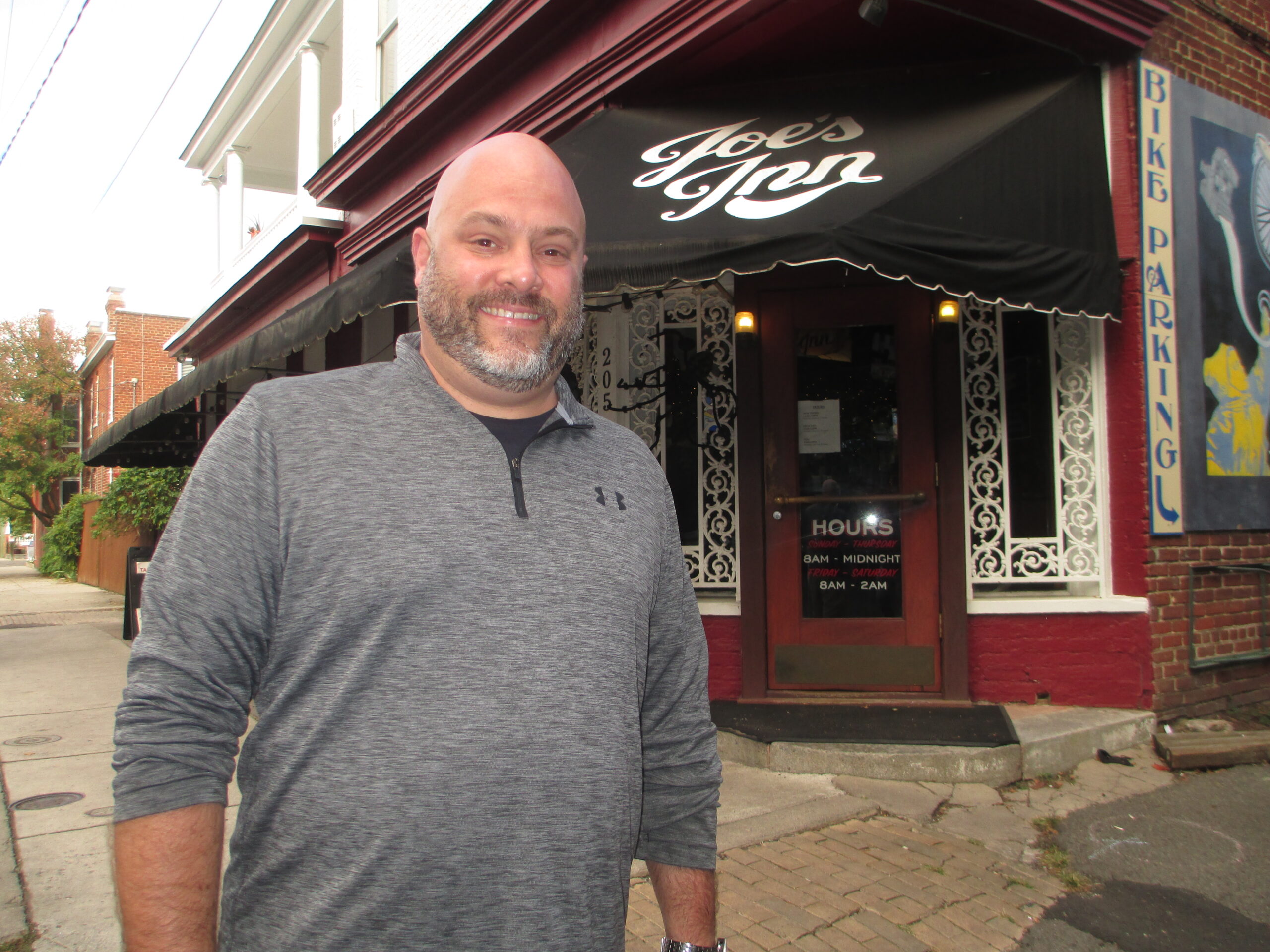
Co-owner Matt McDonald outside Joe’s Inn, where one of the city-funded parklets had been placed and was recently removed. (Jonathan Spiers photo)
While debate over a parklet for Brookland Park Boulevard continues to play out in Richmond’s Northside, one of the pop-up patios placed elsewhere in the city is no longer outside the restaurant that requested it.
And in that case, the restaurant – Fan staple Joe’s Inn – doesn’t want it back.
The 6-by-12-foot enclosure – placed in a curbside parking space in front of Joe’s Inn as one of the first parklets the city rolled out this spring – was removed about a month ago when the city was preparing to resurface Shields Avenue.
When the paving was complete and the parklet could be returned, Joe’s Inn said “no thanks,” co-owner Matt McDonald confirmed.
“We asked them not to bring it back,” McDonald said earlier this month. “Being a full-service restaurant, it made it difficult on us, since we couldn’t treat it as a part of the restaurant.
“The city told us we could essentially serve them to-go food and they could sit out there and eat it, which isn’t what we thought was happening the entire time we were applying for it.”
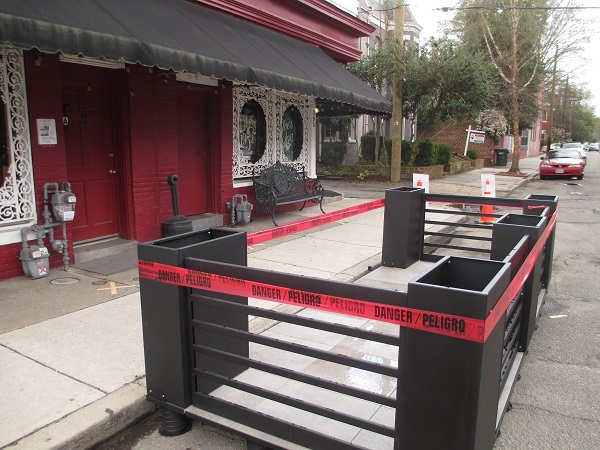
The modular parklet in front of Joe’s Inn in the Fan when it was installed in April. (BizSense file photos)
Because the parklets are placed in city right-of-way, and since its parklet was one of five that the city purchased through its “Picnic in a Parklet” program, the city’s guidelines for the parklets require that they be treated as public spaces, with businesses not allowed to reserve them for outdoor dining — even the businesses that requested them and maintain them as their “stewards.”
While the concept has proven successful with other setups, such as in front of Northside coffee shop Stir Crazy and Fan ice cream shop Scoop, McDonald said it was never going to work for a dine-in restaurant like Joe’s Inn, which has since been able to fully reopen its dining room.
“It just confused a lot of people, because they wanted to sit out there and couldn’t understand why they couldn’t, and it didn’t really get utilized. Some people would sit out there and eat to-go food, but very rare,” McDonald said. “And to lose one of our valuable parking spaces, we weighed out the pros and cons and decided that we should just have it removed, and maybe somebody else could put it to better use.”
The city is now determining a new location for the parklet, said Jason Alley, who helps manage the program as Richmond’s policy advisor for restaurants and small business. The modular, prefabricated parklets the city purchased are portable and designed to be relocated as desired.
Varying results
According to the city, more than 30 businesses expressed interest in the parklets program since it was announced last year, months into the COVID-19 pandemic. Applicants were evaluated based on space availability and other qualifications but some applicants bowed out due to the space requirements.
Working with Venture Richmond, the city purchased five parklets at $10,000 apiece and placed them at the selected locations: Joe’s Inn, Stir Crazy and Scoop, as well as Nile in Church Hill and Hot for Pizza in Carver. The remaining four are often seen in use and have been accentuated with planters and in some cases decorations, as well as tables and chairs donated by furniture store LaDiff.
Two additional parklets, funded by grants and private donations separate from the city program, have also been in the works for locations in Jackson Ward and on Brookland Park Boulevard. But a recent surge in opposition from neighboring business owners has left the Brookland Park parklet planned outside Ms. Bee’s Juice Bar on hold.
While confusion over use and concerns over loss of parking prompted the pause on the effort at Ms. Bee’s, it’s also causing the city to rethink the parklet program, and consider another pandemic-era concept: “streateries.”
Essentially a city-sanctioned space where outdoor dining is allowed for a particular business on part of a sidewalk or street, streateries were mentioned as a possible alternative when Kevin Vonck, the city’s planning director, presented his director’s report to the Richmond Planning Commission this week.
Vonck later said the city is looking into streateries while not looking away from parklets altogether. Where streateries could work better for restaurants in need of additional or outdoor seating, along the lines of sidewalk encroachments already permitted by the city, Vonck said parklets have their place, too.
“A streatery would look, smell, feel just like a parklet, except it could be privately used,” Vonck said Thursday. “It’s really taking the concept of encroachment on city sidewalks for outdoor dining. Those are for the exclusive use of a particular business or an individual. This would be the same, except now it is an encroachment on the street.”
The City of Petersburg did something similar last year when it closed part of Sycamore Street to provide space for outdoor seating for restaurants in the city’s Old Towne area. The Town of Ashland and other localities took similar approaches.
In Richmond’s case, Vonck said his staff is working to determine how and where streateries could be allowed through an amendment to the city’s parklet ordinance, as well as whether some form of compensation from requesting businesses should come with them, to offset the loss of a parking space or curbside area.
“I think it’s just an option that we need to have out there,” Vonck said. “While it’s great that (parklets are) open to the public, that could be asking a lot of a business owner – to maintain and operate it, but then really not be able to cordon it off or use it exclusively for their customers.
“Maybe a parklet ends up being, instead of sponsored by a food or beverage business, something that an office or a non-food-and-beverage use puts out in an area where there are a lot of food-and-beverage establishments, so that all of them can use it. And that way, maybe it provides two different pathways to provide outdoor dining options,” he said.
Such an option could be a better fit for Joe’s Inn, where McDonald said an encroachment for outdoor dining on the sidewalk was more along the lines of what the restaurant had in mind when it applied for a parklet.
“With COVID,” McDonald said, “the city will let you put tables on the sidewalk, so I could have a table on the sidewalk and let them have a full dining experience. But if they’re in the parklet, they can’t.”

Co-owner Matt McDonald outside Joe’s Inn, where one of the city-funded parklets had been placed and was recently removed. (Jonathan Spiers photo)
While debate over a parklet for Brookland Park Boulevard continues to play out in Richmond’s Northside, one of the pop-up patios placed elsewhere in the city is no longer outside the restaurant that requested it.
And in that case, the restaurant – Fan staple Joe’s Inn – doesn’t want it back.
The 6-by-12-foot enclosure – placed in a curbside parking space in front of Joe’s Inn as one of the first parklets the city rolled out this spring – was removed about a month ago when the city was preparing to resurface Shields Avenue.
When the paving was complete and the parklet could be returned, Joe’s Inn said “no thanks,” co-owner Matt McDonald confirmed.
“We asked them not to bring it back,” McDonald said earlier this month. “Being a full-service restaurant, it made it difficult on us, since we couldn’t treat it as a part of the restaurant.
“The city told us we could essentially serve them to-go food and they could sit out there and eat it, which isn’t what we thought was happening the entire time we were applying for it.”

The modular parklet in front of Joe’s Inn in the Fan when it was installed in April. (BizSense file photos)
Because the parklets are placed in city right-of-way, and since its parklet was one of five that the city purchased through its “Picnic in a Parklet” program, the city’s guidelines for the parklets require that they be treated as public spaces, with businesses not allowed to reserve them for outdoor dining — even the businesses that requested them and maintain them as their “stewards.”
While the concept has proven successful with other setups, such as in front of Northside coffee shop Stir Crazy and Fan ice cream shop Scoop, McDonald said it was never going to work for a dine-in restaurant like Joe’s Inn, which has since been able to fully reopen its dining room.
“It just confused a lot of people, because they wanted to sit out there and couldn’t understand why they couldn’t, and it didn’t really get utilized. Some people would sit out there and eat to-go food, but very rare,” McDonald said. “And to lose one of our valuable parking spaces, we weighed out the pros and cons and decided that we should just have it removed, and maybe somebody else could put it to better use.”
The city is now determining a new location for the parklet, said Jason Alley, who helps manage the program as Richmond’s policy advisor for restaurants and small business. The modular, prefabricated parklets the city purchased are portable and designed to be relocated as desired.
Varying results
According to the city, more than 30 businesses expressed interest in the parklets program since it was announced last year, months into the COVID-19 pandemic. Applicants were evaluated based on space availability and other qualifications but some applicants bowed out due to the space requirements.
Working with Venture Richmond, the city purchased five parklets at $10,000 apiece and placed them at the selected locations: Joe’s Inn, Stir Crazy and Scoop, as well as Nile in Church Hill and Hot for Pizza in Carver. The remaining four are often seen in use and have been accentuated with planters and in some cases decorations, as well as tables and chairs donated by furniture store LaDiff.
Two additional parklets, funded by grants and private donations separate from the city program, have also been in the works for locations in Jackson Ward and on Brookland Park Boulevard. But a recent surge in opposition from neighboring business owners has left the Brookland Park parklet planned outside Ms. Bee’s Juice Bar on hold.
While confusion over use and concerns over loss of parking prompted the pause on the effort at Ms. Bee’s, it’s also causing the city to rethink the parklet program, and consider another pandemic-era concept: “streateries.”
Essentially a city-sanctioned space where outdoor dining is allowed for a particular business on part of a sidewalk or street, streateries were mentioned as a possible alternative when Kevin Vonck, the city’s planning director, presented his director’s report to the Richmond Planning Commission this week.
Vonck later said the city is looking into streateries while not looking away from parklets altogether. Where streateries could work better for restaurants in need of additional or outdoor seating, along the lines of sidewalk encroachments already permitted by the city, Vonck said parklets have their place, too.
“A streatery would look, smell, feel just like a parklet, except it could be privately used,” Vonck said Thursday. “It’s really taking the concept of encroachment on city sidewalks for outdoor dining. Those are for the exclusive use of a particular business or an individual. This would be the same, except now it is an encroachment on the street.”
The City of Petersburg did something similar last year when it closed part of Sycamore Street to provide space for outdoor seating for restaurants in the city’s Old Towne area. The Town of Ashland and other localities took similar approaches.
In Richmond’s case, Vonck said his staff is working to determine how and where streateries could be allowed through an amendment to the city’s parklet ordinance, as well as whether some form of compensation from requesting businesses should come with them, to offset the loss of a parking space or curbside area.
“I think it’s just an option that we need to have out there,” Vonck said. “While it’s great that (parklets are) open to the public, that could be asking a lot of a business owner – to maintain and operate it, but then really not be able to cordon it off or use it exclusively for their customers.
“Maybe a parklet ends up being, instead of sponsored by a food or beverage business, something that an office or a non-food-and-beverage use puts out in an area where there are a lot of food-and-beverage establishments, so that all of them can use it. And that way, maybe it provides two different pathways to provide outdoor dining options,” he said.
Such an option could be a better fit for Joe’s Inn, where McDonald said an encroachment for outdoor dining on the sidewalk was more along the lines of what the restaurant had in mind when it applied for a parklet.
“With COVID,” McDonald said, “the city will let you put tables on the sidewalk, so I could have a table on the sidewalk and let them have a full dining experience. But if they’re in the parklet, they can’t.”

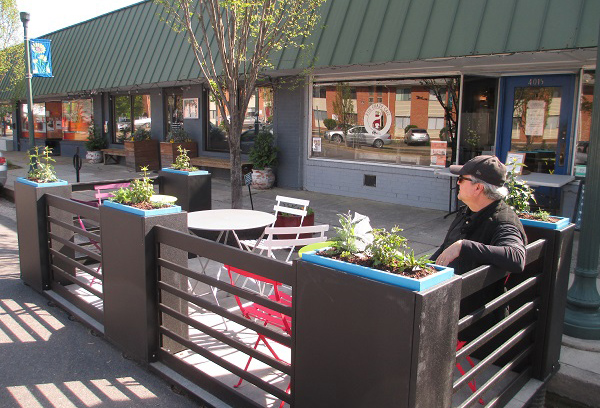
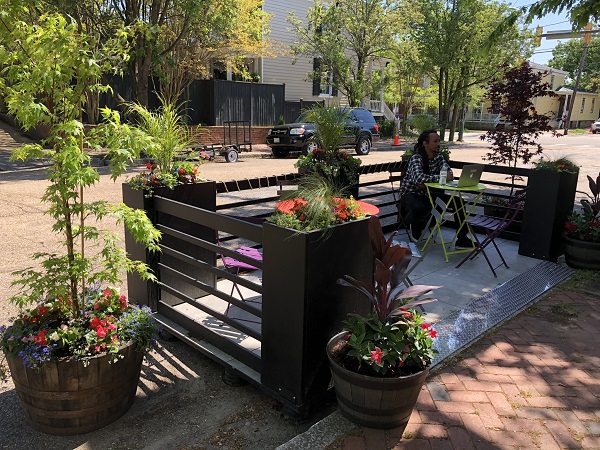
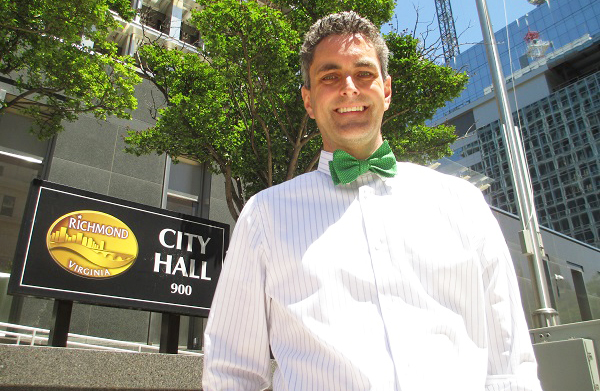


The streets and sewers are 3rd world, but hey, we’ve got bike lanes, “parklets”, murals, dangerous 4-way yield roundabouts, and stop for pedestrian signs in the middle of busy streets. The city planner’s office is a joke.
I think the city should absolutely allow the use of parklets as additional dining terraces. They’re already a big success in cities like Montreal, where in some neighborhoods they subsidize them if a restaurant needs. In Stockholm they are expanding “summer street” closures and outdoor dining terraces. All around the world this concept works and we just need to get it right so we can benefit from the multitude of reasons it benefits cities economies, environment, safety, etc.
Montreal has had them for more than a decade and they are wonderful there. But they also make them wider and little deeper than these. I’m not sure I see much point in these tiny Richmond parklets that only fit 3 two-seater tables.